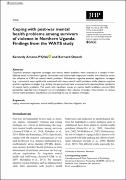| dc.contributor.author | Amone-P'Olak, Kennedy | |
| dc.contributor.author | Omech, Bernard | |
| dc.date.accessioned | 2021-11-22T13:40:10Z | |
| dc.date.available | 2021-11-22T13:40:10Z | |
| dc.date.issued | 2018-05-01 | |
| dc.identifier.citation | Amone-P’Olak, K., & Omech, B. (2020). Coping with post-war mental health problems among survivors of violence in Northern Uganda: Findings from the WAYS study. Journal of health psychology, 25(12), 1857-1870. | en_US |
| dc.identifier.uri | 10.1177/1359105318775185 | |
| dc.identifier.uri | https://hdl.handle.net/123456789/353 | |
| dc.description.abstract | Cognitive emotion regulation strategies and mental health problems were assessed in a sample of war-affected youth in Northern Uganda. Univariable and multivariable regression models were fitted to assess the influence of CERS on mental health problems. Maladaptive cognitive emotion regulation strategies (e.g., rumination) were significantly associated with more mental health problems while adaptive cognitive emotion regulation strategies (e.g., putting into perspective) were associated with reporting fewer symptoms of mental health problems. The youth with significant scores on mental health problems (scores ≥ 85th percentile) reported more frequent use of maladaptive than adaptive strategies. Interventions to reduce mental health problems should focus on enhancing the use of adaptive strategies. | en_US |
| dc.language.iso | en_US | en_US |
| dc.publisher | J Health Psychol | en_US |
| dc.subject | copinge | en_US |
| dc.subject | motional regulation | en_US |
| dc.subject | mental health problems | en_US |
| dc.subject | Northern Uganda | en_US |
| dc.subject | war | en_US |
| dc.title | Coping with post-war mental health problems among survivors of violence in Northern Uganda: Findings from the WAYS study | en_US |
| dc.type | Article | en_US |

